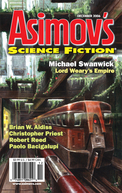
| Editor: | Sheila Williams |
| Issue: | Volume 30, No. 12 |
| ISSN: | 1065-2698 |
| Pages: | 144 |
Sheila Williams had an interesting editorial in this issue about the difficulties in acquiring permission to use lyrics in stories and some related issues of copyright law. There isn't much here I hadn't heard before, but as a magazine editor, she has a different experience. I'd love to see more editorials like this.
Otherwise, this issue wasn't particularly exciting. The best story was Ian Creasey's "The Golden Record," and nothing in this issue including that story was that memorable. There was one notable poem, though. I normally don't pay much attention to the poems, but "An Eccentric in Orbit" by Laurel Winter was worth lingering over.
"Yellow Card Man" by Paolo Bacigalupi: Set in the same universe as "The Calorie Man" but on the other side of the world, here Bacigalupi tells the story of a former multinational corporate executive who's now a member of the down-and-out social class in Thailand, having to scrouge for food and work. It's a dark, cynical, and frequently disgusting story, full of unlikable characters and desperation. There's no surprise ending twist, no redemption, just a world that looks even darker when we leave it than when we entered it. It's not a bad portrait — I could imagine the images and smells — but it's of a deeply unlikable world containing no one I wanted to read about. (3)
"Plausible" by Robert Reed: This is a rather odd story that I didn't enjoy as much as Reed's usual sharply pointed style. The story follows a boy who's getting to see a parade on a world apparently settled by a variety of species, a world with a history of empire but which is never fully explained, just left to the reader to piece things together. I think the main appeal is the excitement of a parade and the wonders of different creatures and strange sights, but I was never interested enough. (4)
"Immunity" by Susan Forest: A doctor on a mining outpost has to make a hard decision about release of limited medicine during an outbreak of disease, too far from supplies to get new until the outbreak is past. Effective enough for what it is, but the moral dilemma was predictable far in advance and I'm not sure this story says much that hasn't been said many times before. Quite readable and mildly entertaining, though. (6)
"Safe!" by Brian W. Aldiss: This is another story that I'm not sure what to make of. It's the story of a mission to Ganymede, the man who glories in his ability to escape the rest of the human race, and the politics he leaves behind him on Earth. It's written in a very flippant and satirical tone (the government in particular is stuffed to the gills with morons), but I was never quite sure what the targets were other than the obvious surface. I think there was depth to this story that I didn't get; not getting it left me without interest in the characters and dissatisfied with the story. (4)
"A Dying Fall" by Christopher Priest: A man is about to die and his life flashes before his eyes. However, what flashes before his eyes is one specific moment that seems completely unrelated to his death. From there, this story goes into a psychological examination of death and fear of dying, of last moments and salvaged life, and of pivotal moments. Once again, I think there were currents I didn't quite follow, but in this case I enjoyed the ride and the ending twist. (7)
"The Golden Record" by Ian Creasey: A protagonist who's a collector for a museum makes for an unusual setup here. One who's just picked up Voyager 2 in a lucky break in deep space, for a world that's abandoned space flight in favor of focusing on fixing the problems on earth, is even more unusual. Throw in a strange remnant of the United States, determined to get back "their" space probe, and a conspiracy theorist who wants the golden record from Voyager 2 for its supposed secret of unlimited energy, and one gets a story that pokes light and occasionally sad fun at the strangeness surrounding space exploration. Underneath is a deep ambiguity about space flight that's more balanced than most of what I've seen in SF. I was impressed; it's possible Creasey meant the space flight idealists to be the most sympathetic choice, but it's possible to read the story either way. (7)
"Lord Weary's Empire" by Michael Swanwick: I liked the world background of this story. This is urban fairy with a vengeance: a hidden underground world of the dregs of a world full of mythical creatures and races, the transients and homeless of the fairy world, who are rallying around a Lord Weary and his band of underground fighters. The protagonist (whose background made me think of something from Xenogears or Xenosaga) fights and plans his way into being Lord Weary's right-hand man as they start extending his empire and preparing to fight the powers of the surface world. The description is beautiful and there are some wonderful moments (the capture of the horses in particular). The ending twist, though, was odd and left a bit of a sour taste in my mouth. It was almost fantastic. I was expecting a completely different climax than the one to which the story was apparently building, and I was prepared to enjoy that a great deal. But instead, Swanwick switched to a quiet ending, leaving me feeling the rug was pulled out from under me more than I wanted. (7)
Reviewed: 2007-02-06